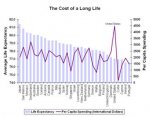Medicare is more efficient than private insurance. Since it isn't out to make a profit, it saves quite a bit of money right there. Additionally, Medicare spending grew more slowly between 1997 and 2009 than did private health insurance premiums, and the CBO projects that this trend will continue for the next 30 years. Medicare's administrative costs are a mere 2% of its budget, versus 17% for private insurance.
Medicare Is More Efficient Than Private Insurance – Health Affairs Blog
In other words, one is accountable to the public (and therefore bases its decisions on what benefits the public, at least in theory) whereas the other is accountable to shareholders (and therefore bases its decisions on what benefits the shareholders).
So? Do you read your annual policy from private insurance companies? Chances are it changes every year too.
See the graph I posted at the beginning of the thread. The notion of needing to spend more to "pay for it" is erroneous, as the US already spends FAR more per capita than any country with universal health care, despite getting results that are, to put it charitably, no better than theirs.


 Poll options edited at users request.
Poll options edited at users request.